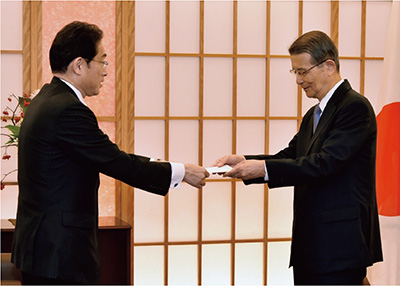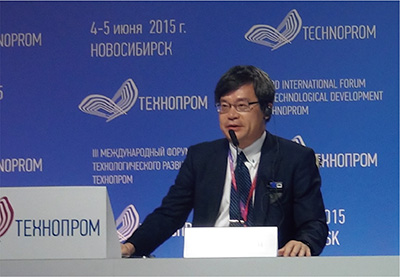Diplomatic Bluebook 2016
Chapter 3
Japan’s Foreign Policy to Promote National and Worldwide Interests
3.Science and Technology Diplomacy
In May, the “Advisory Panel on Science and Technology Diplomacy” submitted a report to Foreign Minister Kishida and presented recommendations on the strategic direction and specific measures of science and technology diplomacy, and the strengthening of the foundation and its human resources toward its effective promotion, etc. Based on one of these recommendations to strengthen the utilization of scientific knowledge in formulating and implementing diplomatic policy, Foreign Minister Kishida appointed Dr. Teruo Kishi, Professor Emeritus of the University of Tokyo, as Science and Technology Advisor to the Minister for Foreign Affairs in September. The Science and Technology Advisor to the Minister for Foreign Affairs supports the activities of the Foreign Minister from the perspective of science and technology, and provides advice on the utilization of science and technology in the planning and coordination of various foreign policies to the Minister and relevant divisions, while strengthening partnerships with Japanese and foreign stakeholders in science and technology.
 Dr. Kishi, Professor Emeritus of the University of Tokyo, was appointed by Foreign Minister Kishida as Science and Technology Advisor to the Minister for Foreign Affairs, receiving the letter of appointment.
Dr. Kishi, Professor Emeritus of the University of Tokyo, was appointed by Foreign Minister Kishida as Science and Technology Advisor to the Minister for Foreign Affairs, receiving the letter of appointment.(September 24, MOFA, Tokyo)
In December, the “Advisory Board for the Promotion of Science and Technology Diplomacy” was launched, whose 17 members are comprised of experts from the academic and private sectors in the fields of life-science/medicine, the environment, and information communication technology, in addition to members of the advisory panel mentioned above. The Board was launched as a part of efforts to construct the “Science and Technology Diplomacy Advisory Network” based on the proposal of the advisory panel, supports the Science and Technology Advisor to the Minister for Foreign Affairs, and helps the diplomacy of the Prime Minister and the Foreign Minister and the planning and coordination of international conferences.
Japan upholds the following four basic concepts for the strategic promotion of science and technology diplomacy: (1) bilateral and multilateral cooperation to promote science and technology and innovation, (2) utilization of science and technology for solving global challenges, (3) promotion of bilateral relations through science and technology cooperation, and (4) promotion of “soft power” as a science and technology-oriented country; and implemented the following measures in 2015:
(1) Joint committee meetings (governmental dialogues) based on Science and Technology Cooperation Agreements were held2 with the following 12 countries / organizations: China, Vietnam, Australia, the United States, Brazil, the Netherlands, Norway, Hungary, Russia, Israel, South Africa and the European Union, and discussed the current status and future direction of cooperation in various areas. In particular, on the occasion of the 14th Joint High-Level Committee (JHLC) meeting in October, in addition to the governmental dialogue, Japan and the U.S. held the third Japan-U.S. Open Forum with the attendance of renowned experts representing government, academia and the industry in Japan and the U.S., and discussed the development of science and technology in high potential areas such as medical- and data area, and how U.S.-Japan cooperation can contribute to the promotion of such development.
(2) From the perspective of security, Japan contributes to the prevention of proliferation of weapons of mass destruction by helping former Soviet scientists engage in research for peaceful purposes, through participation in the International Science and Technology Center (ISTC), and signed the “Agreement on the Continuation of the ISTC” in December.
(3) The external dissemination of information on Japan’s excellent science and technology, as in those in the area of culture, helps to promote understanding of Japan in other countries and improve its image there. Therefore, MOFA sent Dr. Hiroshi Amano, Professor of Nagoya University, the 2014 Nobel Prize laureate in Physics for the development of Blue LED (light-emitting diodes), to Russia and France, to network with researchers, and to promote Japan’s cutting-edge research through lectures at universities and international organizations (UNESCO), and thereby pursued public diplomacy aiming at establishing and reinforcing the international brand image of Japan’s advanced science and technology.
 Lecture by Dr. Amano of Nagoya University at Technoprom in Russia
Lecture by Dr. Amano of Nagoya University at Technoprom in Russia(June 4, Novosibirsk, Russia)
- 2 Japan has signed or concluded 32 science and technology cooperation agreements, which are applicable to 47 countries and organizations.
